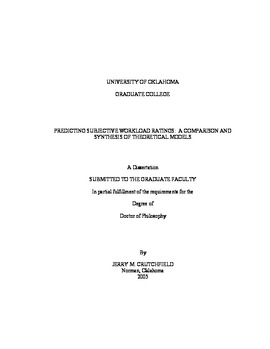| dc.contributor.advisor | Gronlund, Scott D., | en_US |
| dc.contributor.author | Crutchfield, Jerry M. | en_US |
| dc.date.accessioned | 2013-08-16T12:19:53Z | |
| dc.date.available | 2013-08-16T12:19:53Z | |
| dc.date.issued | 2005 | en_US |
| dc.identifier.uri | https://hdl.handle.net/11244/906 | |
| dc.description.abstract | Output data from a computer simulation of two air traffic control (ATC) scenarios were fit to workload ratings that ATC subject matter experts provided while observing each scenario in real time. Simulation output enabled regressions to test the assumptions of a variety of workload prediction models. The models included operational models that use observable situational and behavior variables (such as number of aircraft and communications by type) and theoretical models that use queuing and cognitive architecture variables (such as weightings of activities performed, amount of busy time, and sensory and cognitive resource usage) to predict workload. Regression results suggest models that include number of activities performed weighted by priority are best able to account for the highest amount of variance in subjective workload ratings. | en_US |
| dc.format.extent | viii, 57 leaves : | en_US |
| dc.subject | Air traffic controllers Workload. | en_US |
| dc.subject | Engineering, Industrial. | en_US |
| dc.subject | Psychology, Industrial. | en_US |
| dc.subject | Employees Workload Case studies. | en_US |
| dc.subject | Psychology, Cognitive. | en_US |
| dc.title | Predicting subjective workload ratings: A comparison and synthesis of theoretical models. | en_US |
| dc.type | Thesis | en_US |
| dc.thesis.degree | Ph.D. | en_US |
| dc.thesis.degreeDiscipline | Department of Psychology | en_US |
| dc.note | Adviser: Scott D. Gronlund. | en_US |
| dc.note | Source: Dissertation Abstracts International, Volume: 66-06, Section: B, page: 3433. | en_US |
| ou.identifier | (UMI)AAI3178305 | en_US |
| ou.group | College of Arts and Sciences::Department of Psychology | |
